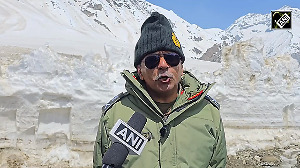The Communist Party of India-Marxist is seething. It is bristling at what it perceives as an insult to the people of West Bengal.
One would not know it from Buddhadev Bhattacharya, the suave chief minister who is deploying a pet stroke to ward off questions about the CPI-M's reaction to five-phase elections in West Bengal: "I am ready to play a one-dayer, I am ready to play a five-day Test match."
But scratch a little and the CPI-M's anger at what it perceives as the Election Commission's biased ways becomes evident.
In no-names-please conversations, CPI-M state committee members will tell you of how a campaign has been unleashed to raise what the communists call the 'bogey of fake voters', how the Rashtriya Swayamsevak Sangh is trying to make a Gujarat out of Bengal by fanning 'latent anti-minority sentiment' and how the EC is, 'in the name of ensuring a level playing field', trying to destroy the CPI-M's most potent weapon: mass mobilisation.
They will tell you that it was the Left Front who, in 2001, decided against public political meetings during exams. And they will also say that the first phase of the elections almost coinciding with board exams (that end on Thursday) is no coincidence.
And they will rattle off figures that will startle you: 291 percent increase in investment in manufacturing industries in the state; maximum poverty alleviation in the last 10 years; highest GDP growth rate (and they will admit Gujarat has beaten them this year).
For every figure chucked at them, they will chuck back three more, trying to be convincingly authentic. They will say they are the only party that focuses on self-criticism.
There are other voices, however, that chorus a completely different picture.
"Vote rigging was started by the Congress under Siddhartha Shankar Ray, but it was sporadic. Today, it is part of the state government's policy. It is centrally organised," says Sunanda Sanyal, a 72-year-old retired English professor who is part of a civil society organisation called Gana Mukti Parishad.
After the CPI-M came to power in 1977 through a free and fair election, 'the police force was unionised, and the Left Front captured the union', says Sanyal.
Bibhuti Nandi, a retired director general of the West Bengal police, agrees. "Total politicisation of the bureaucracy and the police was a calculated step by the CPI-M. The twin pillars of government are completely under the party," he says.
"The Left front also captured the teaching - or rather, the learning system," says Sanyal, adding that the teachers' unions in the state like the All Bengal Primary Teachers Association and the All Bengal Teachers Association are just fronts for the Left. These are completely subservient to the ruling party and are the ones who, as poll officers in the booths, turn a blind eye to the CPI-M's rigging ways, he alleges.
"In voters list revision too, they have a large role to play," points out Sanyal.
West Bengal has the highest number of uneducated youth. "Without unemployed people, vote frauds are not possible," he adds. "Who else would risk rigging in lieu of a good meal," he asks. The official number of unemployed youth is 7.3 million in West Bengal, but people like Sanyal and retired bureaucrat D Banerjee say that figure too is fudged, and it is actually much, much higher.
"They (the Left Front) have developed a vested interest in continued unemployment and underdevelopment," he adds.
He points out that during the 2003 panchayat polls, about 6,800 posts went uncontested. That is proof of the CPI-M's reign of terror at the grassroots. The party says it has done so much for the villagers that people don't feel the need for an alternative.
In West Bengal there are about 48,000 booths in an election. The CPI-M allots five people per booth. The Congress, the Trinamool and the Bharatiya Janata party cannot even man 25,000 booths, points out Amiya Chakraborty, retired political science professor and a known election analyser on Bengali channels.
"There is no one above the age of 10 in West Bengal who has not witnessed vote fraud in some form or the other," Sanyal claims. He and his organisation have had a number of meetings with the Election Commission.
And the EC's steps - like revision of electoral rolls till the day of election, ban on graffiti, reducing the role of the state police and most importantly the raid on the CPI-M party office in Keshpur - have ruffled the Left front's feathers a lot.
And the CPI-M is vowing a popular backlash in the form of a landslide mandate.
Complete coverage: Siege of Left fortress







 © 2025
© 2025